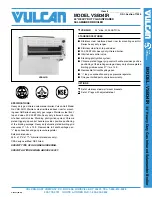
Ts Series Installation and Operation Instructions
│
Trinity Ts
53
16.0
TROUBLESHOOTING
Observe the following precautions when servicing the boiler. Failure to comply with
these may result in fire, property damage, serious injury or death.
Servicing the Boiler
•
Disconnect or shut off all energy sources to the boiler: 120VAC power, water and gas.
•
Identify and mark wires before disconnecting or removing them.
•
Never bypass electrical fuses or limit devices except temporarily for testing.
•
Use proper personal protective equipment (PPE) i.e. eye protection, safety footwear.
These procedures should only be performed by qualified service personnel, when abnormal operation of the
boiler is suspected. The boiler incorporates a sophisticated microprocessor based control which normally
responds appropriately to varying conditions. If the boiler operation appears to be incorrect, or it is not
responding at all to a demand for heat, the following is suggested to determine and correct the problem.
Before undertaking any troubleshooting procedures it is highly recommended to have
available a digital multimeter(s) capable of measuring AC and DC volts, Amperes,
Resistance (ohms) and Continuity.
Check 120VAC and 24VAC at the Boiler
First, verify the following:
•
There is 120V being supplied to the boiler:
o
The circuit breaker in the electrical panel supplying power to the boiler is not tripped.
o
The service switch (if applicable) is in the ON position.
•
There is a heat call from the thermostat:
o
Verify 24VAC to thermostat.
o
The thermostat is placed at a sufficiently high setting to create a call for heat to the boiler.
To check for the presence of 120VAC and 24VAC at the boiler follow this procedure:
•
Remove the boiler front cover.
•
120VAC
o
Disconnect the spark cable from the burner door.
o
Remove the control panel cover. First loosen the two #8 hex-head sheet metal screws securing the cover
to the control panel. Lift the cover off and remove it from the unit, this will expose the field wiring
barrier strip. Note: once the cover is partially removed the spark cable can be disconnected from the
controller.
o
With an AC voltmeter set on the appropriate scale, measure the voltage across the L1 and L2 terminals
(terminals 12 and 13).
o
If 120VAC is not detected, check the electrical service as suggested above. If the service is verified,
inspect the circuit wiring from the panel to the boiler for broken or disconnected conductors.
o
If 120VAC is detected, turn power off to the boiler at the service switch and check the 120VAC fuse
located on the right side of the control panel; refer to Figure 16-1 – replace if necessary.
•
24VAC (only check if 120VAC supply is verified).
o
Disconnect the spark cable from the burner door.
o
Remove the control panel cover. First loosen the two #8 hex-head sheet metal screws securing the cover
to the control panel. Lift the cover off and remove it from the unit, this will expose the field wiring
barrier strip. Note: once the cover is partially removed the spark cable can be disconnected from the
controller.
o
With an AC voltmeter set on the appropriate scale, measure the voltage between the R and COM
terminals (terminals 1 and 2).
o
If 24VAC is not detected, check the 24VAC fuse located at the transformer in the control panel; refer to
Figure 16-1 – replace if necessary.
Only replace fuses with identical parts, see Figure 16-1. Failure to follow this warning
may result in component failure, fire, property damage, serious injury or death.
















































